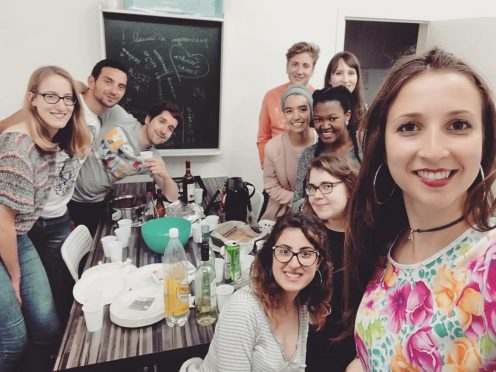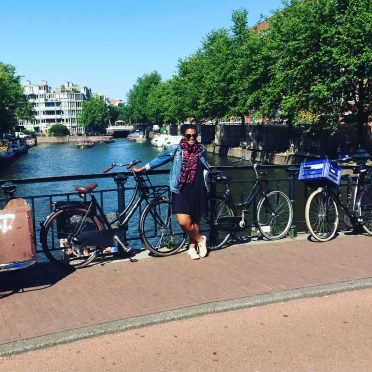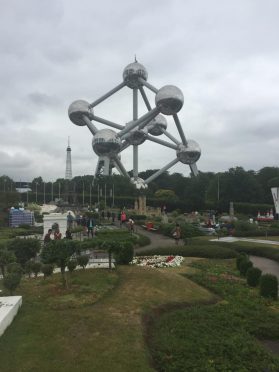Pre- departure:
In making the decision to do a semester exchange (or an exchange of any length) can seem pretty daunting. There is a fair amount of decisions to make at this point already; How long do you want to be on exchange? Which Universities would you like to apply to? What types of funding and learning agreements are available? I spent a fair amount of time reading about the various options on the website of SU International. They give you a pretty good idea of the different types of exchange programs available, the institutions that they have learning agreements and the financial help they can offer. Their two phased application processes is also very well laid out on the website.
When choosing the institutions modules, you will take on exchange, make sure to chat to your supervisor/ lectures about your options. SU International is a great source of information and the staff are always willing to help you out and act as a sounding board when making these tough choices.
Before leaving on exchange, there is a lot to get done, it can seem like an incredibly daunting task at times, but it is important to keep your eye on the prize. The most important thing I have learnt is to BE ORGANIZED.
Flights: proof of travel documents is generally a requirement of your VISA application. Try to shop around for cheap flights and book as well enough in advance as possible. Consider flying to another destination first and making use of the great public transport system to get to your final destination. I flew from O.R Tambo Airport to Schiphol Airport, Amsterdam, via Dubai. I then took an inter-city train from the airport to the central train station in Antwerp. This may seem like a round-about way of traveling, but it is cost effective and I was able to see so much of the beautiful landscapes of the Netherlands and Belgium too. This also gives you the chance to see, arguably, the most beautiful train station in the world! A must-see.
VISA application: the application process can seem rather daunting, but it is made easier by being well prepared. Begin by familiarizing yourself with all the forms you need to fill out and documents you need to collect. My experience was pretty harrowing, having to return to the embassy several times, because documents were missing or incorrect. I can safely say that it pays to be prepared! A long stay Belgian VISA requires the following documents;
- 2 applications, that can be obtained from the Consulate website
- 2 colour, ID type photos
- A valid passport
- A medical certificate (from the list of pre-approved doctors)
- Police clearance with an Apostille
- Letter of registration from a Belgian University
- Proof of scholarship OR proof of financial means (€ 642 per month) with supporting documents
- Original birth certificate with Apostille
- Latest degree with an Apostille (recognition of the university/ institution is needed. This can only be obtained from the department of Higher Education and Training)
- Flight details
- Proof of payment of VISA fees (R 2682) and Belgian admin fees (€ 200)
- Originals and copies of all the above-mentioned documents
Experience at Host institution:
The University of Antwerp is, in some ways, very similar to the University of Stellenbosch. The campus is in the centre of the city and is very much integrated into the way the operates. Being in a student city definitely made me feel a little bit at home.
The orientation programs are something I highly recommend. Not only do you get a feel for the city and the campus, it is also a great way to meet new and interesting exchange students like yourself. The 2 days of orientation were geared towards helping us with all the academic and administrative aspects of your stay, as well as offering me networking / socializing opportunities and great chances to get the know the city.
Classes: I opted to take 5 modules at my host institution. Although I felt slightly out of my element at times, it was really amazing to experience a different type of learning environment, that challenged me in new ways. Many of my classes had an element of normal lecturing and testing styles that I am used to, while others required more a high level of research and presentations each week.
I was rather apprehensive about those modules with numerous presentations each week, but I took it as a chance to step outside of my comfort zone and really develop my presentation skills.
All of my classes where held on the main city campus, which made for a simple commute to and from campus each day. I found the 20-minute walk from my accommodation to campus the easiest way to travel, however there are so many ways to move around the city and the campuses. Many people opt to make use of bicycles. Antwerp is an extremely bike friendly city and there are many ways to get your hands on one (rent one from the University or buy a first or second-hand bike). There is also a great system of trains, trams and busses that you can use to get around.

Social activities: Antwerp is a great little city with so much to see and do! Visit Gate 15 on the main university campus, they have a lot of information in terms of what to see and do around Antwerp. Gate 15 a great place to go for any information, and this is where your Belgian residency will be processed. This is much easier as international students don’t have to travel all the way to Brussels for this.

Must see around Antwerp: I would suggest taking a walking tour of the city in order to get a bit of knowledge of the city and its history as wells as where to get the best chocolates and fries. These are a few of my favourite places and activities around Antwerp:
- Visit Townhall and the Silvius Brabo statue (and hear about the cool way Antwerp got its name).
- Eat some fries (any Belgian will tell you that they should be called Belgian Fries, not French Fries)
- The Museum Ann de Stroom (or MAS Museum) has a spectacular view of the city from the rooftop. Access to the rooftop is free and the museums exhibits can be visited for a fee.
- Have a beer at De Prof after class (a MUST for any student)
- Visit one of the many markets around the city for some great food and fresh produces
- Try to find the best waffles in Antwerp (there is virtually a waffle place on every street)
- Belgium has some beautiful and historic Churches and Cathedrals
- Visit the house of the artist Ruebens
- Take a day trip to the Middelheim Park (an outdoor museum in the park)
- Go to the Museum Plantin-Moretus to learn about Antwerp’s history in printing
- Parkspoor Nord is a great place to hang out with friends and have a Braai (barbeque)

Another great thing about Antwerp, and to a large extent Belgium, is that it is well located for travel. Visiting other cities in Belgium is a must; Ghent, Brussels, Leuven are all so beautiful. If you want to travel a little further, the Netherlands (Rotterdam and Amsterdam) as well as the north of France are only a train ride away. There are also a number of student discounts on flights if you are looking to travel a little further.
Arrival back in South Africa/ Stellenbosch:
Returning home after almost 5 months is always a great experience. South Africa is such an amazing place with such special people, being away from that for so long really makes you appreciated it. There is something to be said about hearing languages that sound familiar to you and eating and doing things that are so distinctly South African.
However, after all the excitement of being home had subsided, I found myself slightly sadder than I expected. The realization that your experience is over felt really sobering to me. On one of my first nights back, on of my Belgian res-mates send me a message, as she too was coming to the realization that we would likely never be in the same place, having that same experience ever again.
The best part is seeing friends and family again and sharing with them all your adventures and experiences. I find it incredibly hard, even now, to explain my exchange experience to people who ask. All the stories you tell and picture you show don’t seem to do justice to the experience. I was able to find a little solace in the fact that I will always have the memories.
I think the greatest take-away from this experience is the genuine connections I was able to make with people who are so different than me. The memories of awkward and often hilarious language miscommunications and having shared so many firsts.
Although being home is bitter-sweet, I know that there are countries in the world where I will always have a home and so many visitors who will be coming to see me in South Africa for the first time.
Now that I am back in Stellenbosch, I feel slightly overwhelmed with having to jump straight back into campus and class life. I am also, more grateful than ever for my education here. For some or other reason we feel that education systems are so out of our league, but I can tell you first-hand that that is not at all true. This experience has made me realize that Stellenbosch University can compete with the best of them. As I being the final semester of my Master’s degree (and possibly the last semester of my university career) I am more motivated that ever to show and share what this exchange has done for me personally and for my academics!

